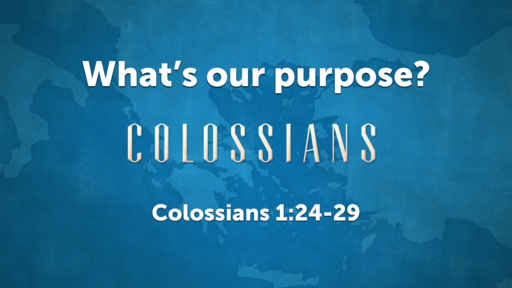What's our purpose?

• First-place in our families.
• First-place in our marriages.
• First-place in our professions.
• First-place in our mission and ministry.
• First-place in matters of the intellect.
• First-place in time.
• First-place in love.
• First-place in conversation.
• First-place in pleasures.
• First in eating.
• First in play.
• First in athletics.
• First in what we watch.
• First-place in art.
• First-place in music.
• First-place in worship.
Paul rejoiced in his purpose of serving the church through presenting the word of God in its fullness — the mystery of Christ — proclaiming Christ, teaching everyone so they may be fully mature in Christ.
How was he a Servant of the church?
What is lacking in regard to Christ’s afflictions?
Paul rejoiced...
Dr. Helen Roseveare, a British medical doctor, has served more than twenty years in Zaire, Africa. For twelve and a half years she had a frenetic but generally wonderful time serving as the only doctor to an area containing more than half a million people (today about one and a half million). But in 1964 revolution overwhelmed the country, and she and her coworkers were thrown into five and a half months of almost unbelievable brutality and torture. On one occasion when Dr. Roseveare was on the verge of being executed, a seventeen-year-old student came to her defense and was savagely beaten as a result. He was kicked about like a football and left for dead. Dr. Roseveare was sick. For a moment she thought that God had forsaken her, even though she did not doubt his reality. But God stepped in, overwhelmed her with the sense of his own presence, and said something like this: “Twenty years ago you asked me for the privilege of being a missionary, the privilege of being identified with me. These are not your sufferings; they are my sufferings.” As the force of that hit home, the doctor said she was overcome with a great sense of privilege. Helen Roseveare’s sense of identification with Christ, of union with him, was elevated by her suffering, and she rejoiced. Paul likewise rejoiced in the sublime oneness he sensed as Christ participated with him in his sufferings.
